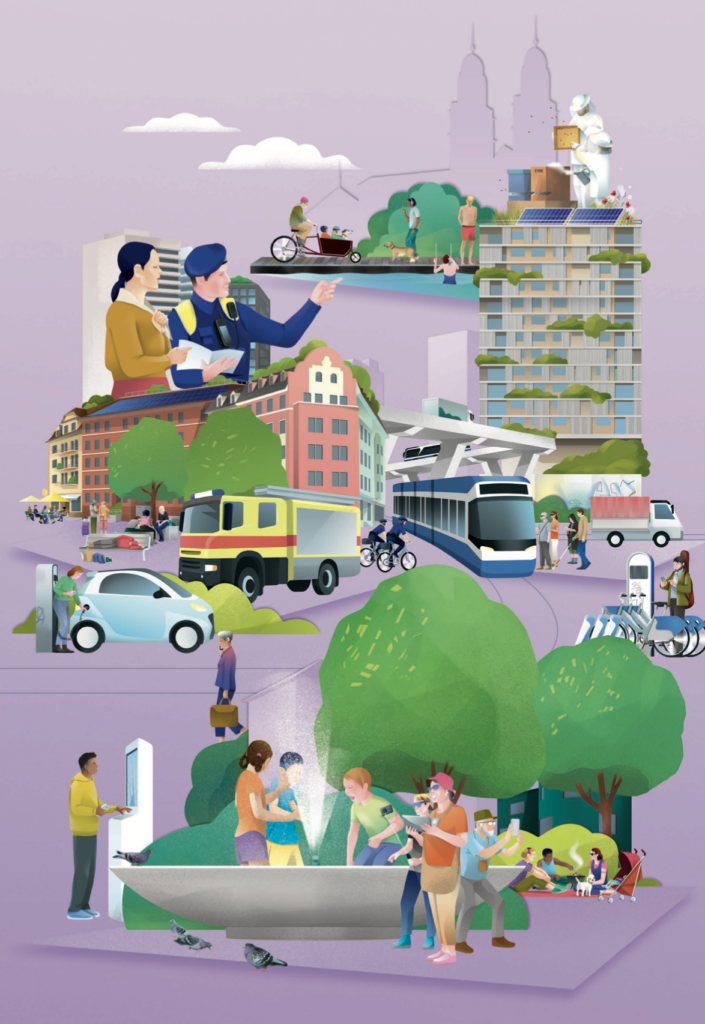
City of Zurich, from Zurich 2040 Strategies Summary.
Zurich’s consistent leadership in the IMD Smart City Index highlights its pioneering approach to urban development, sustainability, and citizen-centric strategies. For five consecutive years, Zurich has maintained its position as the top-ranked smart city globally. David Weber, Head of Smart City Zurich, attributes this success to the city’s long-term vision, integrated governance, and focus on creating social, ecological, and economic value.
Zurich’s “smart” philosophy revolves around connecting people, organizations, and infrastructure to create lasting value. Central to this vision is the Zurich 2040 Strategy, which outlines long-term goals, including achieving net-zero emissions by 2040, optimizing mobility systems, and enhancing urban spaces. Topic-specific frameworks, such as Net Zero 2035/2040 and Urban Space and Mobility 2040, ensure Zurich’s policies address environmental sustainability alongside economic growth and housing needs.
Short-term initiatives have delivered visible benefits, particularly in areas such as public transportation, waste management, and digital services. Zurich’s efficient public transit system, real-time updates, and waste management innovations provide immediate quality-of-life improvements for residents. Meanwhile, investments in renewable energy, green infrastructure, and sustainable construction reflect Zurich’s commitment to long-term urban resilience.
Zurich’s governance structure emphasizes collaboration and consensus-driven decision-making, hallmarks of the Swiss political system. The City Council, with nine full-time members, works across departments to find well-balanced, widely supported solutions for climate protection, mobility, and housing. This approach ensures that policies address the needs of various stakeholders, fostering stability and long-term vision.
Weber highlights the importance of participatory urban development. Zurich’s Mitwirken an Zürichs Zukunft (Shaping Zurich’s Future) platform allows residents to engage directly with planning and construction projects. Additionally, an annual citizen survey, conducted since 1999, tracks satisfaction levels and emerging concerns, enabling the administration to adapt policies in real time.
Zurich’s success is deeply rooted in Swiss values: precision, consensus-building, and a culture of long-term investment. These cultural characteristics enable the city to prioritize sustainability and quality of life over short-term gains. For example, while Asian smart cities often focus on technological advancements driven by rapid urbanization, Zurich balances modern infrastructure with the preservation of public spaces and historical identity.
This cultural approach extends to inclusivity and adaptability. Zurich carefully considers its diverse population’s needs, including non-native residents and businesses, making the city a global role model for harmonizing technology with human well-being.
Weber identifies several areas where cities can achieve quick wins:
• Public Transportation: Implement smart scheduling systems and real-time updates to enhance mobility.
• Waste Management: Adopt efficient and sustainable waste disposal practices for cleaner cities.
• Digital Services: Expand e-governance platforms to improve accessibility and efficiency.
In contrast, long-term strategies such as renewable energy investments, green infrastructure development, and digital literacy programs take years to bear fruit but are transformative. They reduce environmental impact, strengthen economies, and empower citizens to engage in shaping their cities.
Zurich exemplifies how smart cities can balance technological innovation with sustainable, inclusive development. Its governance model, citizen participation, and focus on long-term goals provide valuable lessons for cities worldwide. By adopting Zurich’s holistic approach, cities can deliver immediate benefits while building resilient and livable urban environments for future generations.
To read the full interview, visit the Mayors of Europe website. For more details on Zurich’s long-term vision, explore the Zurich 2040 Strategies summary.


